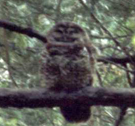Alaskans Feed Themselves from Nature’s Abundance
By Craig L. Fleenor, posted with permission from THE OUTDOORSMAN, Feb-Mar 2009
Craig Fleenor is Director of the Subsistence Division of the Alaska Department of Fish and Game.
Once again Alaska predator management is in the national spotlight. With all of the hype, a very important perspective is often overlooked during this heated debate – that of the subsistence family.
As a young Gwich’in man I grew up in Fort Yukon, depending on wild resources for survival. This life was not a choice but an inter-generational way of life practiced by my family for thousands of years. Like many Alaskans, I was taught that we must manage wolves and bears to protect the local food supply, for safety and to meet other subsistence needs.
Most Alaskans know politics and clever ad campaigns are not what is important. For the subsistence family, acquiring enough food from the land is paramount.
Take the Fort Yukon fisherman who faithfully checks his fish-wheel twice daily, the Anaktuvuk caribou hunter who hopes the herd comes close to the village this year and the Haines moose hunter who spends 12 days hunting. Call it food security, subsistence or even barbarism, but to thousands of Alaskans who live subsistence, it’s about survival.
It’s the fundamental human right of access to high quality, renewable, locally grown, sustainable, affordable food. These needs can only be met if that food is managed for abundance.
In remote Alaska villages, where few roads and stores exist, are the highest commodity prices in the Americas. This country is home to thousands of the hardiest self-sustaining people in some of the harshest climates in North America, where temperatures can drop to minus 70, night can last for three months, and access to fresh food is limited by one’s ability to withstand nature’s conditions.
These people do not ask for handouts; they just want the opportunity to live on the land and provide for their families. All they ask is that we honor our mandate to manage our wild natural resources for the maximum benefit of all Alaskans.
Our push for statehood 50 years ago was rooted in the need for sustainable resource management. According to Article VIII of Alaska’s Constitution, that means managing our resources “for maximum use,” “for the maximum benefit of its people,” and “on the sustained yield principle.” Once the U.S. Congress agreed to allow our entry into the union, it was with the express condition that we manage our resources to provide for ourselves.
Alaska is one of the few remaining places in America where subsistence hunting and fishing is still practiced by a large percentage of its population and is protected by law. While many thousands of Alaskans were born into the subsistence lifestyle, many more have adopted it because of the benefits it provides.
This is why subsistence is the priority use in Alaska. This priority can only be fully realized if there are abundant resources for Alaskans to harvest.
The mandate to manage moose, caribou, fish and waterfowl in abundance comes directly from the people of Alaska. This is not an idea that was dreamed up in a faraway smoke-filled room by the good-old-gang. Alaskan managers and representatives are addressing the needs of subsistence communities by providing more wild food and creating more opportunity to harvest.
The rural subsistence family can’t buy fresh ground, grass-fed buffalo meat from the grocery store. Nor do they have access to freshly delivered vine-ripened tomatoes from the farmer’s market. With fuel prices exceeding $10 per gallon and frozen hamburger at $8 per pound, the subsistence family must rely heavily on the diversity of resources that nature provides.
Those who would prevent active management in our state demonstrate a preference for wolves and bears at the expense of subsistence and abundant natural diversity. Many of those at odds with the idea of abundance management have not lived the subsistence life in rural Alaska.
It is easy for them to stand outside and cast stones at Alaska’s wildlife managers or try to divide Alaskans in another battle over depleted resources. Platitudes regarding the hands-off approach to “natural balance” management sound very eco-friendly, but they fail miserably at providing the resources that tens of thousands of Alaskans need for survival.
*****
NOTE: Beginning the last week in February, 2009, the Alaska Board of Game met for more than a week to consider about 250 new proposals for wolf and bear control in various locations across Alaska. Representatives of local area Fish and Game Advisory Committees reported ongoing declines in both caribou and moose populations in spite of limited or closed hunting seasons in their areas for several years.
Many also reported human safety concerns with wolves invading their villages at night and cow moose moving into the villages to have their calves in an effort to escape the wolves. They also report excessive bear populations are adding to personal safety concerns.
The private land and shoot permits have not met wolf reduction goals and ADFG employees began shooting wolves from helicopters as this issue goes to press. – Outdoorsman editor George Dovel
*****
A donation in any amount will help defray our cost of printing and mailing The Outdoorsman to more than 250 state and federal elected or appointed officials. A donation of $25 or more will pay the cost of printing and mailing all bulletins to you, or to anyone else you designate, for the period of one year.
Mail to:
The Outdoorsman
P.O. Box 155
Horseshoe Bend, ID 83629
Name__________________________________________
Mailing Address__________________________________
City______________________State_____Zip_________
Amount Enclosed_______ Phone (optional)_____________
New ______ Renewal_____ Extension______ Gift_____
by Val

This is a good article about the need to control predator numbers.